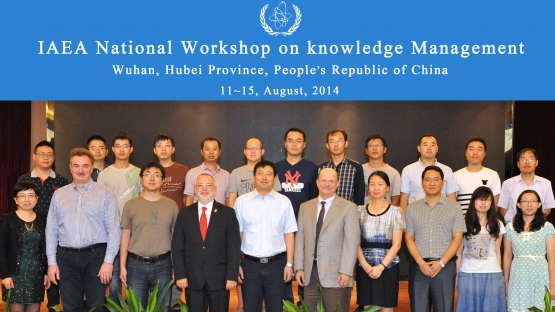11 - 15 August 2014, China
In the framework of the Asian Nuclear Safety Network (ANSN) a Regional Workshop on Knowledge Management was held in September 2013. The workshop was hosted by The Research Institute of Nuclear Power Operation (RINPO). The Vice President of the Institute, Mr Li Sujia, suggested at that time to continue the collaboration between the IAEA and RINPO in the area of Nuclear Knowledge Management and transfer the methodology of the Knowledge Management Assist Visits (KMAV) to RINPO, who would like to prepare such visits to operating NPPs of The People's Republic of China. After almost one year of preparation, a workshop was organized to train and establish the RINPO knowledge management (KM) team on the approach to organize and implement the KMAVs. The RINPO KM team and representatives of the NPPs - altogether 25 experts - were trained through a KM pre-training course using the IAEA's learning management system platform (Cyber Learning Platform for Nuclear Education and Training "CLP4NET") before the workshop. Volunteers also completed a self-=assessment module in the pre-training course. This option helped the IAEA organizers to accelerate the training and focus on practical approaches during the workshop, which took place on 11-15 August 2014 in Wuhan, and was hosted by RINPO. The main objectives of the workshop were to adapt the IAEA KMAV methodology described in IAEA TECDOC-1586 (see link below) and to develop the self-assessment tool for Chinese nuclear operating organizations. The second important objective of the workshop was to review and discuss the draft procedure for critical knowledge identification for China National Nuclear Power Co, Ltd.
After adapting the methodology, the first NPP where a KMAV will be conducted is Tianwan NPP (Jiangsu Nuclear Power Corporation). The KMAV is planned for the last week of October 2014. This initiative was supported by the Permanent Mission of the People's Republic of China and implemented through regional projects of the IAEA's Technical Cooperation, and their support is graciously acknowledged.


